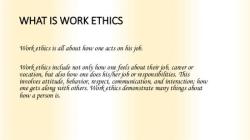What are some good work ethics?
Good work ethics are essential for personal and professional success. They involve a set of values, behaviors, and attitudes that contribute to a positive work environment and effective work performance. Here are some key characteristics of good work ethics:
Reliability:
- Reliable employees can be counted on to fulfill their responsibilities, meet deadlines, and consistently produce quality work. They are punctual and fulfill their commitments.
Punctuality:
- Being on time for work, meetings, and deadlines demonstrates respect for other people's time and a commitment to the organization's schedule.
Professionalism:
- Professionalism involves maintaining a positive and respectful attitude, dressing appropriately, and conducting oneself with integrity and courtesy in the workplace.
Accountability:
- Accountable individuals take responsibility for their actions and outcomes. They don't blame others for mistakes and are willing to learn from their experiences.
Integrity:
- Integrity is a fundamental component of good work ethics. It involves honesty, transparency, and adherence to ethical principles in all professional dealings.
Teamwork:
- Collaborative and cooperative employees work well with others, contribute to team efforts, and communicate effectively. They value the success of the team as much as their individual achievements.
Adaptability:
- Being adaptable means being open to change, willing to learn new skills, and adjusting to evolving work conditions. Adaptability is crucial in today's dynamic and fast-paced work environments.
Initiative:
- Individuals with a strong work ethic take the initiative to go above and beyond their basic job responsibilities. They are proactive, identify areas for improvement, and seek opportunities for growth.
Respect:
- Respectful behavior involves treating colleagues, superiors, and subordinates with courtesy and consideration. This includes active listening, valuing diverse perspectives, and avoiding discriminatory practices.
Diligence:
- Diligent workers are committed to putting forth their best effort in all tasks. They are thorough, detail-oriented, and strive for excellence.
Conflict Resolution Skills:
- Effective conflict resolution involves addressing disagreements or disputes in a constructive manner. Good work ethic includes the ability to navigate conflicts professionally and seek resolutions.
Time Management:
- Efficient use of time is a key component of good work ethics. This includes prioritizing tasks, meeting deadlines, and managing workload effectively.
Continuous Learning:
- A commitment to continuous learning and professional development is indicative of a strong work ethic. Employees who seek to enhance their skills and knowledge contribute to their long-term success and that of their organization.
Communication Skills:
- Good communication skills, both verbal and written, are essential. Clear and effective communication fosters understanding, reduces misunderstandings, and promotes a positive work environment.
Work-Life Balance:
- Balancing work and personal life is crucial for sustaining high levels of productivity and avoiding burnout. Good work ethics include recognizing the importance of maintaining a healthy work-life balance.
These characteristics collectively contribute to a positive work culture and individual success in the professional realm. Cultivating good work ethics requires self-awareness, a commitment to personal development, and a genuine desire to contribute positively to the workplace.
What are some examples of positive work ethics in the workplace?
Positive work ethics encompass a range of attitudes and behaviors that contribute to a productive, respectful, and fulfilling work environment. Here are some key examples:
Reliability and Accountability:
- Meeting deadlines consistently and exceeding expectations when possible.
- Taking ownership of tasks and assignments, seeing them through to completion.
- Admitting mistakes and proactively seeking solutions to rectify them.
- Being accountable for one's actions and their impact on colleagues and the organization.
Proactive and Collaborative:
- Taking initiative to identify and address problems before they escalate.
- Seeking additional responsibilities and learning opportunities to grow professionally.
- Helping colleagues when needed and offering support without being asked.
- Communicating effectively and openly, sharing information and ideas readily.
- Being adaptable and flexible, willing to adjust to changing priorities and circumstances.
Integrity and Respect:
- Maintaining high ethical standards, acting with honesty and fairness in all interactions.
- Treating colleagues with respect, regardless of their position or background.
- Giving and receiving constructive feedback in a professional and helpful manner.
- Maintaining confidentiality and respecting organizational policies and procedures.
- Recognizing and celebrating the contributions of others, fostering a positive and supportive work environment.
Personal and Professional Development:
- Demonstrating a commitment to continuous learning and skill development.
- Taking advantage of training opportunities offered by the organization.
- Staying up-to-date with industry trends and best practices.
- Sharing knowledge and expertise with others, mentoring and supporting colleagues.
- Maintaining a positive and optimistic attitude, even in challenging situations.
These are just some examples, and the specific behaviors that demonstrate positive work ethics can vary depending on the workplace culture and individual roles. However, by focusing on these core principles, you can cultivate a strong work ethic that benefits both you and your organization.
Remember, positive work ethics are not a static state but rather an ongoing journey. Be intentional about your actions, seek feedback, and continuously strive to improve your professional conduct. By doing so, you can become a valuable asset to your team and contribute to a thriving work environment.
I hope this helps! Feel free to ask if you have any further questions about specific aspects of positive work ethics.





